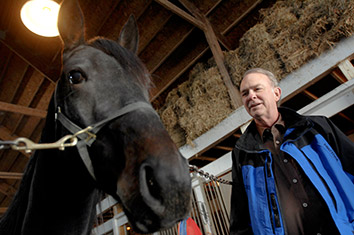Subscriber Benefit
As a subscriber you can listen to articles at work, in the car, or while you work out. Subscribe NowIndiana's booming thoroughbred horse breeding industry has been growing so fast in recent years it's even lured breeders away from horse powerhouse Kentucky.
But some of Indiana's thoroughbred breeders are worried that their good days could take a hit if state lawmakers approve proposed cuts to a state incentive fund.
The Courier-Journal of Louisville, Ky., reports that more than $57 million of racetrack slot-machine tax revenue last year was directed to the fund for Indiana's horse industry, which employs an estimated 5,800 people involved in horse breeding at more than 1,500 farms.
A budget plan approved by the Indiana House and under consideration by the Senate, however, would cut that money roughly in half. (Find IBJ's February coverage of this issue here.)
With cuts that size, "you're basically going back to the beginning of when it was struggling," said Gale Bess, general manager and part owner of Scottsburg's Lake Shore Farm, which got into the breeding business last year because of the slots-funded incentives.
A piece of the slot machine revenue from Indiana's two horse racing tracks is directed to breeders and owners chiefly through larger purses for winning races and awards for Indiana-bred horses that do well in Indiana races.
Expected increases in gambling this year mean the breeding industry could get about $58 million based on the existing incentive law, including about $27 million for thoroughbreds, according to legislative estimates. If the House budget plan eventually wins final legislative approval, though, the industry would get a total of about $29 million, including $13 million for thoroughbreds.
The Senate already has begun its own hearings on the House proposal, with breeders from Michigan, Colorado and Ohio saying the incentives led them to invest in Indiana — and that cuts to the fund would make them reconsider.
Senate Appropriations Chairman Luke Kenley, R-Noblesville, said he doesn't know what his committee will decide when it makes changes to the House proposal, but said he's not inclined to alter the current law.
"We made this investment with the idea in mind we would get a return . and we're getting more of a return than we even anticipated," Kenley said. "I think it's a terrible precedent to think we're going to make these kinds of investments and then not follow through."
Indiana law currently provides the horse industry with up to 15 percent of the racetrack slots revenue after winnings are paid. Thoroughbreds and standardbreds each get 46 percent of the total, with the quarterhorse industry getting the remaining 8 percent.
The fund replaced a subsidy that the horse industry received from riverboat casinos until the legislature approved the racetrack slots in 2007. Since then, Indiana's breeding statistics have soared with the growth in incentives.
The state's 25 percent growth in the foal crop from 2008-09 was the largest among significant racing states.
Southern Indiana has three major breeding operations, which all say at least 35 percent of their boarding business comes from Kentucky.
"When the slots came in, we really took off," said Larry Ernst, who has bred thoroughbreds at his Foot Fall Farm in Palmyra since the late 1990s. "They all want to come over here because that's where the money was."
Still, Indiana represents just a portion of the overall U.S. foal crop, at about 2 percent in 2009. Indiana breeders acknowledge the state won't replace Kentucky, which had about a third of the crop, as the nation's horse breeding capital.
Please enable JavaScript to view this content.

